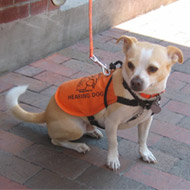Say “yes” to assistance dogs

Under section 37 of the Disability Discrimination Act, it is an offence for a taxi driver to refuse to carry an assistance dog.
Taxi drivers are being reminded of their legal requirement to carry guide dogs when required by passengers with disabilities.
The reminder has been issued by the Department for Infrastructure (DFI), who are working closely with Guide Dogs to ensure that people who use assistance dogs are fully aware of their rights.
Under section 37 of the Disability Discrimination Act, it is an offence for a taxi driver to refuse to carry an assistance dog. It is also illegal for taxi drivers to make charges for doing so, unless they display an exemption certificate.
If a taxi driver has a genuine medical reason for not being able to carry an assistance dog, they must apply to the DFI for an exemption certificate and display it in the taxi.
Failure to adhere to these conditions could result in a fine of up to £1000.



 The latest
The latest